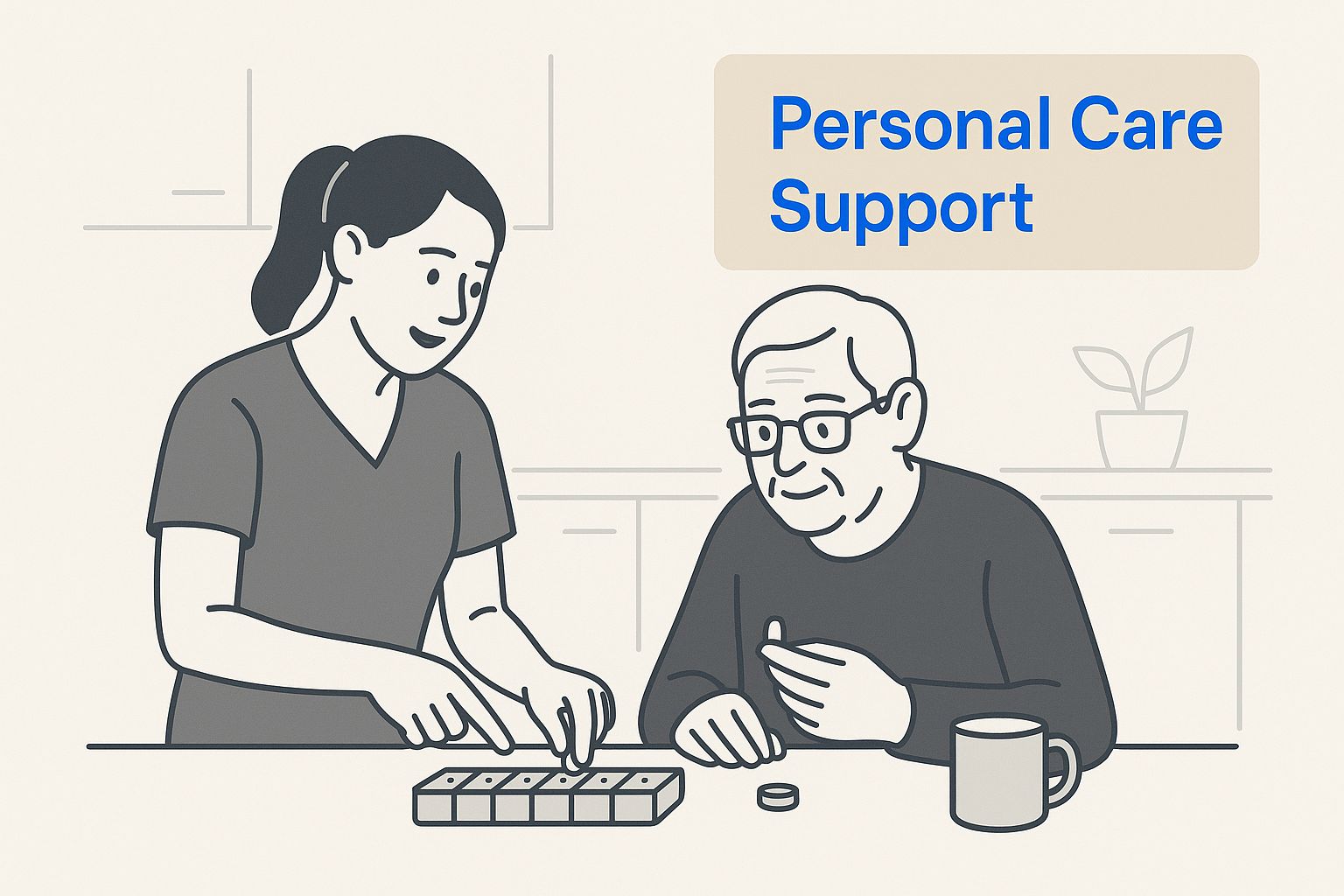When daily life becomes a struggle due to age, illness, or a disability, many families assume the only option is a residential facility. But there's another path—one that allows people to stay right where they feel most comfortable and secure: in their own homes.
This is where home care providers come in. They are the dedicated professionals who provide a support system inside a person's home, helping them live safely and with dignity.
Understanding the Role of Home Care Providers
Think of a home care provider as a trusted partner who steps in to help with the everyday tasks that have become too challenging. This could be anything from preparing a meal and doing a bit of housekeeping to assisting with personal grooming or simply offering a reminder to take medication.
They aren't there to take over. Instead, they enable independence. Their support allows people to remain in the cherished, familiar comfort of their homes instead of moving into a nursing home or assisted living facility.
It’s an idea that has really resonated with families who want personalized, one-on-one attention for their loved ones. The numbers back this up, too. The U.S. home care market was recently valued at around $151.7 billion after growing 7.0% in a single year, and it’s expected to keep expanding. This isn't just a statistic; it’s a clear sign that families are choosing in-home support to preserve quality of life. You can dig deeper into the growth of the home care industry with this report from IBISWorld.
The Goal of In-Home Support
At its heart, the goal of a home care provider is to create a supportive environment built around an individual’s unique needs. It’s a partnership, not a takeover.
A great home care provider works with the family, focusing on what a person can do and filling in the gaps where support is needed most. It’s all about helping them continue to live a fulfilling life with safety and confidence.
This support shows up in a few key ways:
- Promoting Safety: A caregiver can help spot and reduce the risk of falls or other common household accidents.
- Ensuring Comfort: They help keep the living space clean, organized, and pleasant—a true sanctuary.
- Providing Companionship: Loneliness can be a real problem. A friendly face and a good conversation can make all the difference.
- Supporting Health Routines: From simple medication reminders to providing transportation to a doctor's appointment, they help keep health on track.
Ultimately, these professionals offer something invaluable: peace of mind. It's a relief not just for the person receiving care, but for their entire family, who can finally rest easy knowing their loved one is in capable and compassionate hands.
The Spectrum of Home Care Services
The phrase "home care" covers a huge range of support, kind of like how your family doctor handles everything from yearly check-ups to referring you to a specialist. To figure out what you or your loved one really needs, you have to understand the different types of care out there. Home care providers don’t just have a single, generic service; they offer specific kinds of support designed for very different situations, from a helping hand with daily chores to complex medical care.
Getting a handle on this spectrum is the first step toward building a care plan that actually works. You wouldn't go to a cardiologist for a sprained ankle, right? It's the same idea here. You need to match the caregiver's skills with the individual's needs. This focused approach is safer, promotes a better quality of life, and makes sure you're getting real value from your investment in care.
Personal Care Assistance
This is probably what most people think of when they hear "in-home care." It’s all about helping with the basic Activities of Daily Living (ADLs). A personal caregiver is like a supportive partner, helping with those fundamental tasks that let someone live with independence and dignity.
Think of it as having a trusted hand to help with the morning rush. A caregiver might help a senior with dementia get out of bed safely, assist with bathing and getting dressed, and then make a healthy breakfast. This kind of support isn't just about ticking boxes on a to-do list; it’s about creating stability and providing a comforting, familiar presence.

As you can see, even straightforward, non-medical support can make all the difference in someone's ability to live safely and independently right where they want to be—at home.
Skilled Nursing Services
When a person's needs cross over into the medical realm, it’s time for skilled nursing services. This isn't just assistance; it's clinical care delivered by a Registered Nurse (RN) or Licensed Practical Nurse (LPN), always under a doctor's orders. This is the kind of care someone might need after being discharged from the hospital or while managing a serious chronic illness.
This could include things like:
- Wound Care and Dressing Changes: Making sure a surgical incision heals properly and stays free of infection.
- Intravenous (IV) Therapy: Administering medications, hydration, or nutrition directly at home, avoiding a trip to a clinic.
- Disease Management Education: For example, teaching a newly diagnosed diabetic patient how to monitor their blood sugar and adjust their diet.
This level of care is what bridges the gap between a hospital stay and a safe recovery at home, ensuring that medical instructions are followed to the letter.
Companionship and Respite Care
Physical health is only half the battle. Emotional and social well-being are just as important for a person's overall quality of life. Companionship services are designed to fight the loneliness and isolation that so many seniors face, while respite care gives family caregivers a desperately needed break.
A companion caregiver does so much more than just occupy the same room. They might share a game of chess, take a walk through a local park, or help with a beloved hobby. It's about fostering genuine human connection and keeping the mind active.
Respite care, on the other hand, is an absolute lifeline for families. It allows a spouse, son, or daughter who acts as the primary caregiver to step away for a few hours—or even a few days—knowing their loved one is in safe, capable hands. This simple break is one of the most effective ways to prevent caregiver burnout.
To help you see how these different services work, we've put together a quick summary table.
Home Care Services at a Glance
| Service Type | Key Activities Included | Ideal for Individuals Needing |
|---|---|---|
| Personal Care | Bathing, dressing, grooming, toileting, mobility assistance, meal preparation. | Support with the basic activities of daily living to maintain independence. |
| Skilled Nursing | Wound care, IV therapy, medication administration, disease management. | Medical care at home under a doctor's supervision, often post-hospitalization. |
| Companionship | Social interaction, hobbies, errands, light housekeeping, conversation. | Social engagement to combat loneliness and support emotional well-being. |
| Respite Care | Short-term care to relieve a primary family caregiver. | A break for family caregivers to prevent burnout and tend to personal needs. |
This table provides a clear snapshot, but for a more detailed breakdown, you can explore our complete home care services list to see how these options can be combined.
The demand for this kind of flexible, in-home support is growing fast. Right now, around 15 million Americans get care at home, and that number is only going to increase as more people choose to age in place. It's a powerful shift away from institutional settings and toward the comfort and familiarity of home.
The True Benefits of Aging in Place
Making a decision about professional care is about so much more than logistics. It’s a deeply personal choice, one that’s tied to quality of life, comfort, and dignity. There's a near-universal desire to age in place—that is, to stay right at home—and it speaks volumes about our need for connection to the places that hold our stories.

This isn’t just a feeling; the numbers back it up. Roughly 75% of Americans over 50 want to live out their years in their own homes. This powerful preference is steering the future of senior care, even as the population of adults 65 and older is poised for significant growth.
Comfort in Familiar Surroundings
There’s a unique kind of security that comes from being surrounded by your own things—that favorite armchair molded perfectly to you, the gallery of family photos on the wall, the specific way the light hits the kitchen in the morning. Home care providers make it possible for seniors to hold onto these simple but profound comforts.
Staying in this familiar environment is a balm for emotional well-being. It can reduce stress and even positively impact cognitive function, which is especially crucial for those navigating memory conditions. The simple act of following established routines in a known setting provides a sense of control that’s often the first thing lost in an institutional setting.
The Dignity of Independence
Let's be clear: independence isn't about doing everything by yourself. It’s about having the freedom to make your own choices about your own day. In-home care is built to support this autonomy, not take it away. A caregiver might step in to help with more challenging tasks while encouraging your loved one to handle what they still can.
This partnership approach is incredibly empowering. It helps seniors maintain their sense of self-worth and purpose. Instead of having to adapt to a facility's rigid schedule, they get to decide when they wake up, what they have for lunch, and how they spend their afternoon. You can learn more about this in our guide on the core benefits of aging in place.
Think about Eleanor, an 88-year-old artist who started having trouble with her mobility after a fall. For her, moving to a facility felt like she'd have to give up her passion. Instead, her family brought in a caregiver for a few hours each day. The caregiver helped with meals and light housekeeping, but most importantly, made sure Eleanor could safely get to her art studio in the spare room. That support allowed her to keep painting, preserving not just her independence, but her very identity.
This kind of personalized, one-on-one attention is the heart of great home care. It provides more than just physical support—it offers invaluable peace of mind for the whole family, knowing their loved one is safe, respected, and truly living in the place they love most.
Choosing the Right Provider in Mercer County

Picking a home care provider is a huge decision, one of the most important a family can make. You’re doing more than just hiring a service—you’re inviting a professional into your home and trusting them with the well-being of someone you love. In a place like Mercer County, where you have plenty of options, taking a methodical approach is the best way to find a true partner who fits your family’s needs and values.
Think of it like hiring a key player for your family's team. You'd want to check their qualifications, talk to their references, and make sure they’re a good personality fit. Doing the homework upfront can save you a world of stress down the road.
The end goal is simple: to move forward with total confidence, knowing you’ve found an agency that is reliable, compassionate, and completely professional.
Verifying Credentials and Safety Protocols
Before you get into the details of care schedules and specific needs, you have to confirm the agency is legitimate and puts safety first. These are the absolute non-negotiables. Don’t just take their word for it; ask for proof and get clear explanations of how they operate.
Start with these fundamentals:
- Licensing and Insurance: Is the agency properly licensed by the State of New Jersey? Do they have liability insurance and workers' compensation? This is crucial because it protects your family from financial risk if an accident ever happens on your property.
- Caregiver Screening: What does their hiring process really look like? Reputable home care providers will run thorough national background checks, verify every credential, and check references for every single person they hire. No exceptions.
- Training and Supervision: How are caregivers trained when they first start, and what kind of ongoing education do they receive? It's a great sign if they offer specialized training for conditions like dementia or Parkinson's. You'll also want to know how a registered nurse or care manager oversees their work in the field.
A transparent agency will be proud to tell you all about their safety protocols. If a provider gets vague or cagey when you ask about their screening process or insurance, that's a major red flag. This initial vetting is your first line of defense.
Asking the Right Questions During Your Search
Once you’ve confirmed the agency is solid on the safety front, it's time to dig into the specifics of how they actually deliver care. Your interview with a potential agency should be a real, detailed conversation. Come prepared with a list of questions to make sure you cover all your bases and can fairly compare one provider to another.
The following table is a great starting point. It lays out the essential questions you should ask every potential home care agency you speak with. This isn't just a checklist; it's a way to ensure you're gathering the same critical information from everyone, which makes the final decision so much easier.
Essential Questions to Ask Potential Home Care Agencies
| Area of Inquiry | Key Questions to Ask |
|---|---|
| Care Planning | How do you create a personalized care plan? Who is involved in that process? How often is the plan reviewed and updated? |
| Caregiver Matching | What is your process for matching a caregiver to a client’s personality and needs? What happens if the caregiver isn't a good fit? |
| Communication | Who is my main point of contact at the agency? How does the caregiver report on their shifts? What is the protocol for family communication? |
| Emergency Procedures | What is your plan for a medical emergency? How do you handle a situation where a caregiver cannot make their scheduled shift? |
| Cost and Contracts | Can you provide a detailed breakdown of your rates? Are there minimum service hours? What is your policy for canceling or changing services? |
Having a structured approach like this helps you cut through the sales pitch and get to the information that truly matters.
For families in and around the Princeton area, looking at a localized provider often means you benefit from deeper community knowledge and quicker response times. You can discover more about these focused services by learning about home care in Princeton, NJ and seeing how it’s tailored to the community. At the end of the day, choosing the right provider is all about finding a true partner in care.
Preparing Your Home and Family for Care
Inviting someone new into your home is a big deal, even when it’s a professional caregiver. A smooth transition doesn’t just happen—it takes a bit of thoughtful preparation from everyone involved, including the home care providers. Getting ahead of it helps manage expectations, eases any anxiety, and starts building a foundation of trust from day one.
Think of it like setting the stage for a great partnership. The goal is to create an environment where your loved one feels comfortable, the caregiver feels respected and ready to do their job, and the whole family feels confident about the new arrangement. A little prep work can turn what could be a stressful adjustment into a genuinely positive experience.
Fostering Clear and Open Communication
Good communication is everything in a successful caregiving relationship. It all starts with setting up clear channels with the agency before the first caregiver even walks through the door. You should know exactly who to call for scheduling changes, questions, or any concerns that pop up.
To make things easier for everyone, consider putting together a simple “care binder” or a shared digital document. It can include things like:
- Emergency Contacts: A go-to list of family members, doctors, and neighbors.
- Daily Routines: Notes on preferred meal times, medication schedules, and favorite TV shows or hobbies.
- Household Information: Quick pointers on where to find cleaning supplies, how the thermostat works, or the location of the circuit breaker.
- Likes and Dislikes: Little details about favorite foods, music, or conversation topics can really help the caregiver and your loved one connect.
This simple tool gives the caregiver the inside scoop they need to provide truly personal support right away.
Preparing the Physical Space
Now, take a walk through your home and try to see it from a caregiver’s perspective. Safety and accessibility are the main goals here. You don’t need to start a major renovation; often, small tweaks can make a huge difference in creating a safer, more functional space for everyone.
A well-prepared home does more than just prevent accidents—it sends a clear message to the caregiver that they are a valued professional. It shows you’ve thought about their needs, which helps build a respectful and collaborative relationship from the very beginning.
Simple changes can make a world of difference. Focus on clearing walkways to prevent trips and falls, making sure hallways and bathrooms are well-lit, and installing grab bars where they might be needed. It’s also a kind gesture to set aside a small, private spot where the caregiver can store their personal items during their shift. It’s a simple way to show respect and helps maintain professional boundaries.
Common Questions About Home Care
Diving into the world of in-home support for a loved one always brings up a lot of questions. As you start thinking about finding the right home care providers for your family, it's completely normal for practical and financial concerns to be at the top of your list. Getting clear, straightforward answers is the key to making a decision you can feel good about.
This last section tackles some of the most common questions we hear from families. Think of it as a quick guide to help you connect all the dots.
What Is the Difference Between Home Care and Home Health Care?
This is probably one of the most important things to get straight right from the start. The easiest way to think about it is like the difference between a kind, helpful neighbor and a visiting nurse—both are incredibly valuable, but they show up for very different reasons.
- Home Care is all about non-medical, personal support. It’s help with the activities of daily living, like bathing and dressing, making nutritious meals, or simply providing friendly companionship. The goal is to boost quality of life and help someone maintain their independence at home.
- Home Health Care is skilled medical care that has to be ordered by a doctor. This involves services that can only be delivered by licensed professionals, like a registered nurse changing a surgical dressing or a physical therapist guiding rehabilitation exercises.
Figuring out which type of support your loved one needs is the absolute first step in your search.
The key takeaway is simple: Home care helps with living, while home health care helps with healing. It’s not uncommon for someone to need both at the same time, but they are arranged and paid for in completely different ways.
How Is the Cost of Home Care Determined?
For most families, the financial piece of the puzzle is a major consideration. Home care costs are almost always based on an hourly rate, but that rate can shift based on a few key things.
The specific location within a state, the intensity of care needed (for instance, basic companionship costs less than hands-on personal care), and how many hours of care are needed each week all play a role. It's also important to know that most standard health insurance plans and Medicare do not cover these non-medical services.
But that doesn't mean you're on your own. Many long-term care insurance policies are designed specifically to cover these kinds of costs. Plus, some state-specific Medicaid waiver programs might offer coverage for those who qualify. The best move is to always check directly with your insurance provider or a local agency on aging to see what benefits are available.
How Is a Personalized Care Plan Created?
A truly great home care experience is never one-size-fits-all. Any reputable agency will insist on starting with a thorough in-home assessment, which is usually handled by a registered nurse or a seasoned care manager.
This first meeting is really a collaborative conversation. The care manager will sit down with you and your loved one to get a deep, genuine understanding of their specific needs, daily rhythms, personal likes and dislikes, and what everyone hopes to achieve with care.
Based on that detailed chat, they’ll create a written care plan. This document is the roadmap for the caregiver, clearly outlining every task, the schedule, and the specific goals of care. It's a living document, too—meant to be reviewed and adjusted as your loved one's needs naturally change over time.
At NJ Caregiving, we believe that open communication and truly personalized planning are the foundations of exceptional care. If you still have questions or you’re ready to talk about how our services can support your family in Mercer County, please contact us today at NJ Caregiving. We’re here to help.



